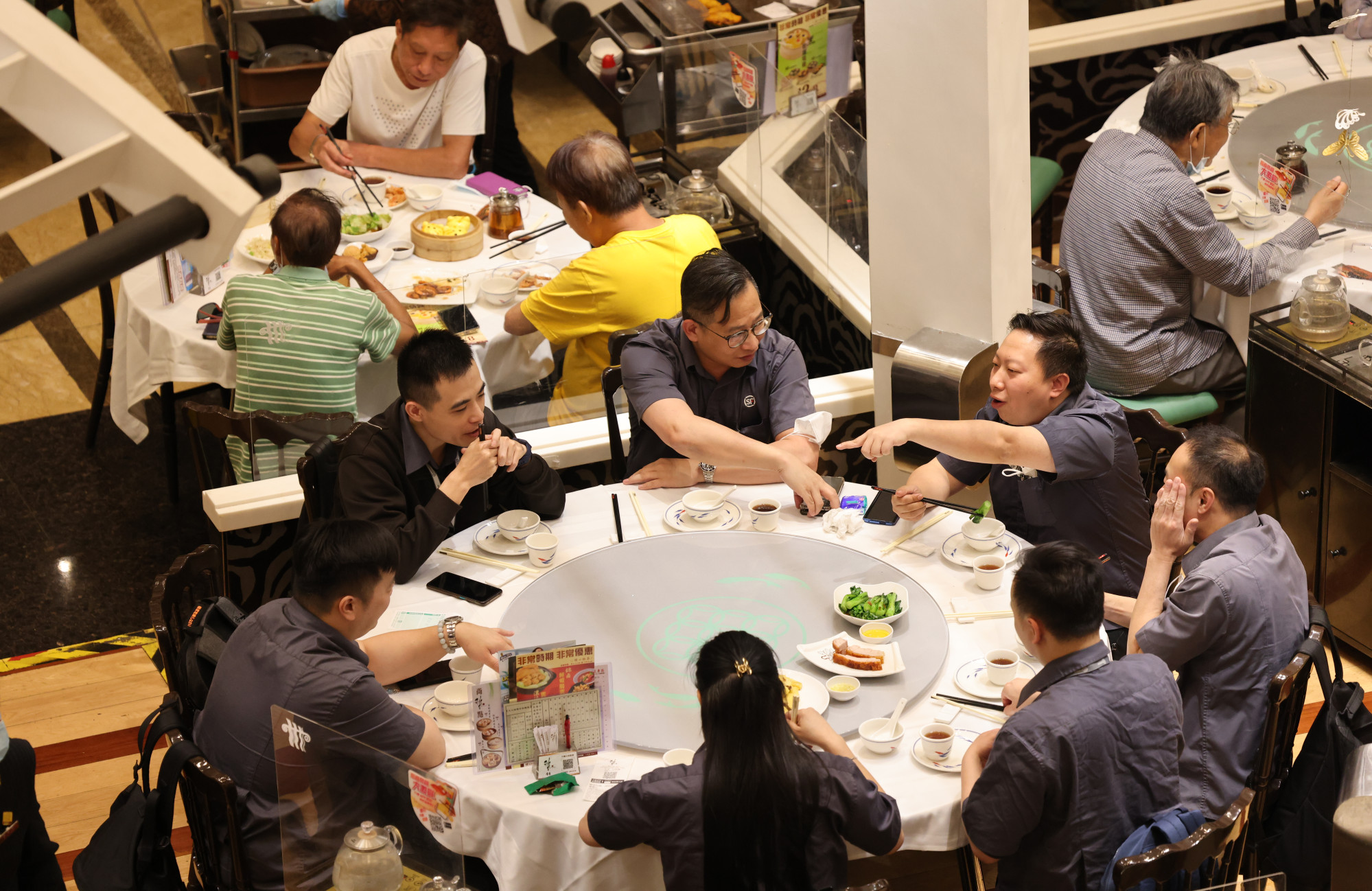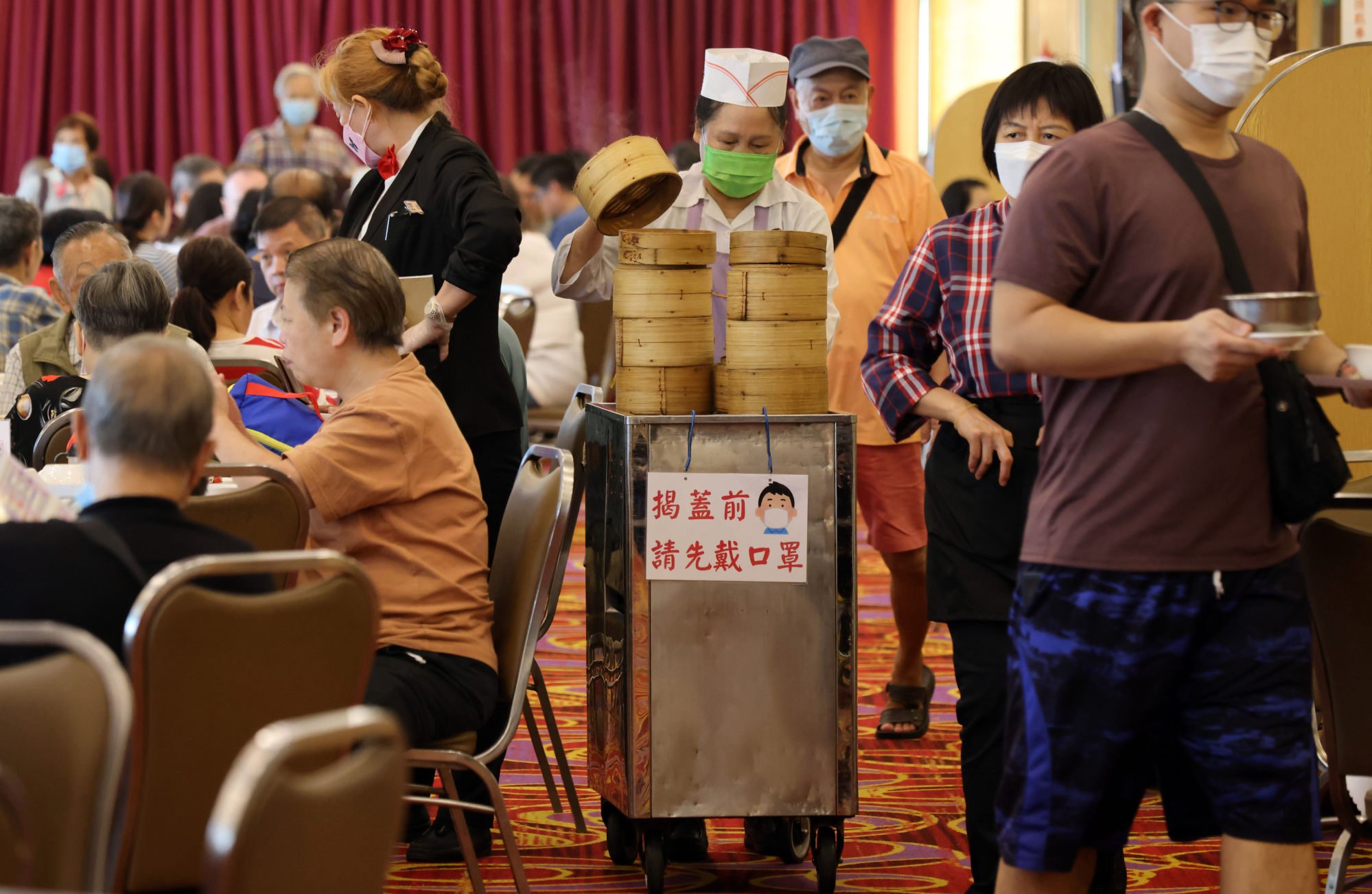
Coronavirus: Hong Kong daily Covid numbers expected to hit five digits ‘in coming days’ but experts dismiss need for tighter curbs
- Government advisers say latest developments are expected, further tightening of social-distancing rules not required
- Health officials report 9,708 new infections, including 213 imported cases, on Sunday while 10 more deaths are recorded
Government advisers said the latest developments were “expected” and dismissed the need for further tightening of social-distancing rules, as the number of new cases hit 9,708 on Sunday, including 213 imported infections, the highest since March 26.
Ten more deaths were reported, bringing the number of Covid-related fatalities to 9,664. The city’s total Covid-19 tally now stands at 1,513,972.

Dr Chuang Shuk-kwan of the Centre for Health Protection said the number of confirmed cases was rising at a faster rate, “possibly due to the increasing proportion of BA.5”.
She added: “A number exceeding 10,000 is expected in the coming days.”
Chuang said the proportion of BA.4 and BA.5 cases among infections reported on Thursday was 50.5 per cent, while that of BA.2, the dominant strain during the fifth wave, was 43 per cent.
“Now the predominant strain is already suspected to be BA.4 or BA.5 but we need to observe for a few more days to see the exact trend,” she noted, adding that fewer than 2 per cent of cases each day involved reinfection.
Hong Kong gears up for Covid fight as health chief warns tighter curbs possible
The Hospital Authority also announced it would adjust services at some general outpatient clinics by suspending or reducing certain sessions from Monday in a bid to focus resources on those needing treatment for Covid-19.
It said it would increase the quota for designated clinics and tele-consultation services for patients isolating at home to more than 3,000. It added that resources could be further allocated if needed.
Hong Kong private hospitals ‘could be punished’ over low non-Covid patient intake
The authority said the transfer of non-coronavirus patients to private hospitals – which had earlier offered 364 beds to ease the burden on public facilities – had improved. Chief Executive John Lee Ka-chiu had on Saturday called the transfers “as slow as a turtle”.
“We have possibly spent more time on liaising and communicating. As time passes, [the situation] has improved. I think we share the same target and we should not pick out which side has more problems,” said Dr Larry Lee Lap-yip, an authority chief manager, adding that 237 beds offered by private hospitals were being used.
Hong Kong leader to pursue reopening of border with mainland China on trip
Government pandemic adviser Professor Ivan Hung Fan-ngai said a further rise in infections was foreseeable but changes to social-distancing measures were not needed.
“Tightening social distancing will further postpone the inevitable, delay the economic recovery and might even worsen the winter Covid-19 and influenza surge,” said Hung, chief of the University of Hong Kong’s infectious diseases division. He urged the government to focus on boosting vaccination among the elderly and children.
Hung also dismissed concerns about the takeover of BA.5. “As BA.5 is replacing BA.2, those who were not infected early this year or are not fully vaccinated are expected to get infected. Nevertheless, the majority will be mild or asymptomatic cases.”
Fellow adviser Professor David Hui Shu-cheong of Chinese University echoed Hung’s views, stressing that the city should concentrate on the figures for hospitalisation, patients in intensive care and deaths, as well as vaccination.
Education minister Christine Choi Yuk-lin had earlier said the government might suspend full-day in-person classes if the daily caseload exceeds 10,000.

Restaurants, meanwhile, said they expected losses as banquet guests or groups of more than eight diners were required to present a photo of a negative RAT result obtained 24 hours before entry in a measure that came into force from Sunday.
“Patrons in groups of nine or 10 have cancelled dinner bookings after the policy was announced [on Friday]. Fewer people came for dim sum in the morning as well,” said William So Man-sing, assistant general manager of London Restaurant in Mong Kok.
So said he expected to lose 20 per cent of business in light of the new measure, adding he had not received any diners in groups of more than eight in the morning.
The restaurant had also prepared 100 RAT kits for potential patrons who had not done the test, So said, but customers would bear the cost of each HK$10 (US$1.27) kit.
“I need to make space for a test area and also to clean and disinfect the place every time. I hope patrons can do their rapid tests at home, it will be more convenient,” So said.
Health authorities said patrons should take a test at home rather than at a restaurant to prevent transmission, while recovered patients were not exempted from the requirement.
Instead of taking RAT tests, patrons can also present a text message of a negative polymerase chain reaction (PCR) result issued within 48 hours prior to entry.
The requirement is an extension of an existing policy for bar-goers.
Agnes Lam, 40, who often has large family gatherings with elderly people in their 70s, said she found the new policy inconvenient, but it would not discourage her from such meet-ups.
“We live in different parts of the city so we tend to meet outside. It will be a bit troublesome to conduct rapid tests for senior residents. They thought they had fulfilled the requirement as they have been vaccinated,” she said.
“We will need to convince them to adapt to the new measure.”
Additional reporting by Tony Cheung


